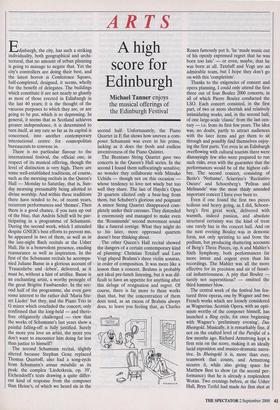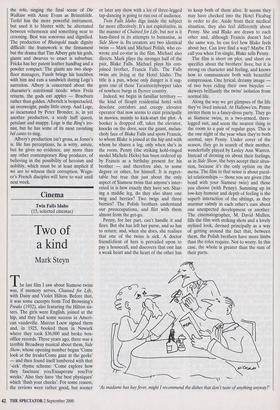ARTS
A high score for Edinburgh
Michael Tanner enjoys the musical offerings of the Edinburgh Festival
Edinburgh, the city, has such a striking individuality, both geographical and archi- tectural, that no amount of urban planning is going to manage to negate that. Yet the city's controllers are doing their best, and the latest horror is Conference Square, half-completed, designed, it seems, wholly for the benefit of delegates. The buildings which constitute it are not nearly so ghastly as most of those erected in Edinburgh in the last 40 years; it is the thought of the vacuous purposes to which they are, or are going to be put, which is so depressing. In general, it seems that as Scotland achieves greater independence, it is determined to turn itself, at any rate so far as its capital is concerned, into another contemporary international centre for cosmopolitan bureaucrats to convene in.
There is no particular flavour to the international festival, the official one, in respect of its musical offering, though the level of distinction is very high. There are some well-established traditions, of course, such as the morning recitals in the Queen's Hall — Monday to Saturday, that is, Sun- day morning presumably being allotted to divine worship. And within these traditions there have tended to be, of recent years, recurrent performances and 'themes'. Then there is a good chance, if you turn up out of the blue, that Andras Schiff will be par- ticipating in a programme of Schumann. During the second week, which I attended despite GNER's best efforts to prevent me, he appeared in two of them, as well as in the late-night Bach recitals at the Usher Hall. He is a benevolent presence, exuding reassurance as well as inspiration. In the first of the Schumann recitals he accompa- nied Juliane Banse in a glorious account of `Frauenliebe und -leben', delivered, as it must be, without a hint of artifice. Banse is an enchanting artist, a worthy protegee of the great Brigitte Fassbaender. In the sec- ond half of the programme, she even gave some interest to the rather dull 'Maria Stu- art Lieder' but they, and the Piano Trio in G minor which concluded the concert, only confirmed that the long-held — and there- fore obligatorily challenged — view that the works of Schumann's last years show a painful falling-off is fully justified. Surely the more you love an artist, the more you don't want to encounter him doing far less than justice to himself?
The second Schumann recital, slightly altered because Stephan Genz replaced Thomas Quartoff, also had a song-cycle from Schumann's annul mirabilis as its peak: the complex `Liederkreis, op. 39', Eichendorffs texts drawing a quite differ- ent kind of response from the composer than Heine's, of which we heard six in the second half. Unfortunately, the Piano Quartet in E flat shows how uneven a com- poser Schumann was even in his prime, lacking as it does the fresh and endless inventiveness of the Piano Quintet.
The Brentano String Quartet gave two concerts in the Queen's Hall series. In the second I found them suffocatingly sensitive; no wonder they collaborate with Mitsuko Uchida — though not on this occasion whose tendency to love not wisely but too well they share. The last of Haydn's Opus 20 quartets elicited only a bear-hug from them, but Schubert's glorious and poignant A minor String Quartet disappeared com- pletely under their caresses. They distended it enormously and managed to make even the aosamunde' second movement sound like a funeral cortege. What they might do to his later, more oppressed quartets doesn't bear thinking about.
The other Queen's Hall recital showed the dangers of a certain contemporary kind of planning: Christian Tetzlaff and Lars Vogt played Brahms's three violin sonatas, in order of composition. It was more like a lesson than a concert. Brahms is probably not ideal pre-lunch listening, but it was dif- ficult to have an appetite for anything after this deluge of resignation and regret. Of course, there is far more to these works than that, but the concentration of them does tend, as an excess of Brahms always does, to leave you feeling that, as Charles Rosen famously put it, 'he 'made music out of his openly expressed regret that he was born too late' — or even, maybe, that he was born at all. Tetzlaff and Vogt are an admirable team, but I hope they don't go on with this 'completism'.
Thanks to the exigencies of concert and opera planning, I could only attend the first three out of four Boulez 2000 concerts, in all of which Pierre Boulez conducted the LSO. Each concert consisted, in the first part, of two or more shortish and relatively intimidating works, and, in the second half, of one large-scale 'classic' from the last cen- tury — i.e. from its first few years. The idea was, no doubt, partly to attract audiences with the later items and get them to sit through and possibly find themselves enjoy- ing the first parts. Yet even in an Edinburgh overflowing with cultural tourists there were dismayingly few who were prepared to run such risks, even with the guarantee that the performances would be of the highest cali- bre. The second concert, consisting of Berio's `Nottumo', Sciarrino's aecitativo Oscuro' and Schoenberg's 'Pelleas and Melisande' was the most thinly attended important concert I have ever been to.
Even if one found the first two pieces tedious and heavy going, as I did, Schoen- berg's first great work, delivered with warmth, indeed passion, and absolute structural certainty was the kind of treat one rarely has in the concert hall. And on the next evening Boulez was in demonic form, not only sprinting to and from the podium, but producing shattering accounts of Berg's Three Pieces, op. 6 and Mahler's Sixth Symphony, both performances far more intent and cogent even than his recordings. The Mahler was all the more effective for its precision and air of fanati- cal industriousness. A pity that Boulez surely not superstitious? — omitted the third hammer blow.
The central week of the festival has fea- tured three operas, one by Wagner and two French works which are loosely considered as Wagnerian. Scottish Opera, with an opti- mism worthy of the composer himself, has launched a Ring cycle, for once beginning with Wagner's 'preliminary evening', Das Rheingold. Musically, it is remarkably fine, if not on the exalted level of the Parstfal of a few months ago. Richard Armstrong kept a firm rein on the score, making it an ideally lucid exposition and musico-dramatic narra- tive. In Rheingold it is, more than ever, teamwork that counts, and Armstrong secures it, while also giving space for Matthew Best to show (at the second per- formance) that he is already a resplendent Wotan. Two evenings before, at the Usher Hall, Bryn Terfel had made his first shot at the role, singing the final scene of Die Walkiire with Anne Evans as Briinnhilde. Terfel has the more powerful instrument, but used it to bluster with; he alternated between vehemence and something near to crooning. Best was sonorous and dignified. The production of Rheingold made dignity difficult: the framework is the firmament but the drama that Tim Albery gets his gods, giants and dwarves to enact is suburban. Fricka has her patent leather handbag and a powder compact. The giants are two shop- floor managers, Fasolt brings his lunchbox with him and eats a sandwich during Loge's narration. Albery is concerned about the character's nutritional needs: when Freia returns, the gods eat apples — Braeburn rather than golden. Alberich is bespectacled, an overweight, pushy little creep. And Loge, as incarnated by Peter Bronder, is, in yet another production, a seedy huff queen, petulant and snappy. Loge is the Ring's iro- nist, but he has some of its most ravishing bel canto to sing.
Albery's production isn't gross, as Jones's is. He has perceptions, he is witty, astute, but he gives no evidence, any more than any other contemporary Ring producer, of believing in the possibility of heroism and nobility, which must be at least implicit if we are to witness their corruption. Wagn- er's French disciples will have to wait until next week.



























































 Previous page
Previous page